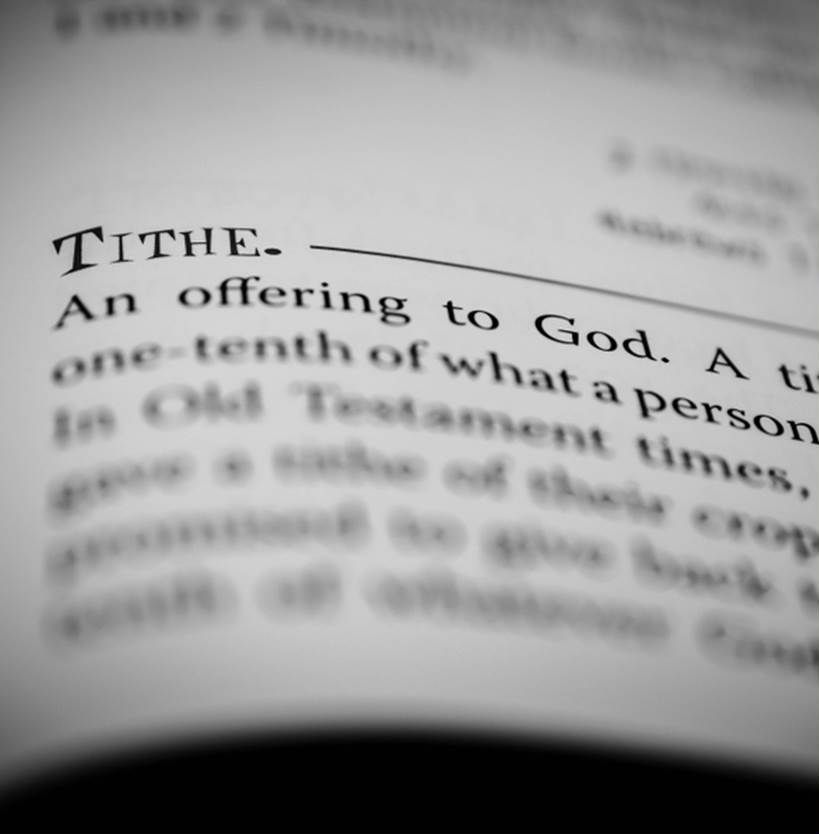Susan Puzio (Prophetic News Network) interviews R. Renee about The Tithing Hoax. Listen to this engaging and informative conversation about the false tithing doctrine and its impact on the Body of Christ.
Table of Contents
- Listen to the Interview
- Check Out Part 2 of the Interview
- FAQs -Tithing Questions and Answers
- Outsmart the False Teachers
Listen to the Interview
NOTE: Below is a transcript of the interview. Minor edits have been made to improve clarity.
SUSAN PUZIO, HOST:
Hello everyone, and God bless you.
This is Susan Puzio, and this is the Prophetic News Broadcast on Blog Talk Radio.
I want to welcome everybody today.
We have a special guest, the author of The Tithing Hoax, and we will be discussing Tithing.
Are New Testament Christians compelled to tithe?
Otherwise, God will curse you.
What is that all about?
Anyway, we’re going to find out the truth.
We want to base everything we do upon the Word of God because that is our guidebook.
That’s the only source of truth for us.
As Christians, we know that we are supposed to be givers.
We have the greatest example of a giver in the Father God, who so loved the world that he gave.
His only begotten son he gave because he loved, and that should be our motive for everything
that we do.
Not because we’re afraid of God, we’re afraid to be cursed.
It’s a bunch of foolishness.
Anyway, I’m going to bring my guest on, and we’re going to talk about The Tithing Hoax
today.
Hi, how are you?
R. RENEE: Hi, Susan.
How are you doing?
SUSAN PUZIO, HOST:
Good.
God bless you.
R. RENEE: Thank you.
Can you hear me fine?
SUSAN PUZIO, HOST:
Yes.
Yes, I can.
I’m very happy to have you on today because this subject is very important.
When you look at so many Bible teachers, books, and Christian television programs and how people are ignorant of the Word of God, it is amazing that this one subject is particularly a source of so much error.
And how did you come to write this book, The Tithing Hoax?
R. RENEE: Well, actually, I started this book several years ago, and I often watched preachers on television and listened to them on the radio, and I noticed there was a great deal of emphasis being placed on tithing.
And listening to some of these preachers, I noticed something about their tithing teachings: something just wasn’t right.
In my spirit, I said that what this preacher was saying was not correct.
And so, from that point, I proceeded to research and study the topic of tithing for myself.
And I found a clear distinction between what many of these preachers were teaching and saying about tithing and what the Bible said.
So, what they were teaching and preaching did not align with Scripture.
So, out of my research and study, I just compiled that information and put it in this book, The
Tithing Hoax.
SUSAN PUZIO, HOST:
So I’ve been saved, born again, for about 30 years.
And it took me about 15 years before I studied it for myself.
I was a regular tither.
Oh, I was afraid God would curse me, and he wouldn’t bless me if I didn’t give him that
10%.
Oh, I was always so afraid.
And I didn’t find that I was getting all the finances and everything that I was
supposed to be getting because I was tithing.
And I also found that in churches, people were so hypnotized to tithing that
they couldn’t think about helping anybody else because they felt so compelled to give this 10%.
And it wasn’t an act of love.
R. RENEE: Exactly.
SUSAN PUZIO, HOST:
It was manipulation.
I decided I would search and search out all the Scriptures. I’m giving based on this whole seed faith thing.
And with tithing, I found the same thing.
I found out that tithing was food, which I found very interesting.
Because I never heard any pastor or teacher teaching it.
R. RENEE: Right.
SUSAN PUZIO, HOST:
They always equate tithing with money.
It was money, according to their misinterpretation of scripture.
So, did you ever find, I never found, one scripture that ever associated tithing with money?
R. RENEE: No.
The biblical tithe was 10% because the word tithe means 10%.
And the biblical tithe was 10% of ancient Israel’s agricultural produce.
So it was vegetables, fruits, grains, even wines, cattle, and things of that nature.
It was anything that people could consume.
You know?
And you cannot consume money.
That’s one of the false teachings that we wanted to correct and let people know that the biblical tithe did not consist of money, and many of these preachers always wanted to equate that with money.
And they would make the argument that, well, there wasn’t a monetary system at that time.
So that’s why they had to use agriculture.
But once again, when we searched the Scriptures, I found that there was a monetary system. In ancient times, they used silver and gold coins to make purchases.
So if God wanted money, God in the Scriptures would have commanded they pay 10% in coins, 10% in silver, and whatnot.
But God did not command that.
God strictly commands that the tithe be paid from agricultural produce.
SUSAN PUZIO, HOST:
Yes.
Also, I found that they put it in the context of a free-will offering when talking about silver and gold.
R. RENEE: Right.
SUSAN PUZIO, HOST:
And so I heard Joyce Meyer the other day.
She had, I guess, the lady who assisted her. They were answering questions from people
and so they were asking about whether the tithe was for a New Testament believer.
And I was really surprised at Joyce’s ignorance because she’s a Bible teacher, claims to
be a Bible teacher, but she didn’t research it herself.
And kind of, they get this attitude where, oh, well, why would we even care about what tithing is, whether it’s food or money or whatever?
We, we, oh, we have to give.
We know we’re supposed to give.
Why?
I mean, any born-again Christian that has the Spirit of God in us, we know that we’re
supposed to help people.
R. RENEE: Mm-hmm.
SUSAN PUZIO, HOST:
I find that there’s a lot of politics involved with tithing.
R. RENEE: Yeah.
SUSAN PUZIO, HOST:
For instance, when I was preaching in churches, you were afraid to talk about it.
When I found out about it, at first, I was afraid to talk about it because I knew if I told the truth about tithing or seed faith, they weren’t going to invite me anymore because the pastor, most of the pastors didn’t like it if you told people the truth.
I don’t know what they’re afraid of, but they didn’t want you to tell the truth about tithing or seed faith.
R. RENEE: You know, it’s, it’s, tithing is a, how should we say?
A business.
It’s a business.
It’s a, it’s a, is a money-making venture.
So when we started preaching the truth about tithing, you’re getting into the pastor’s pocket.
SUSAN PUZIO, HOST:
Yeah.
R. RENEE: And they don’t want anyone messing with their money.
And I’m saying, wait a minute, if you’re a preacher, you’re a preacher of the Gospel. You’re supposed to be preaching the truth.
You’re supposed to be standing on the truth.
SUSAN PUZIO, HOST:
Yes.
R. RENEE: Your primary concern is making sure your pockets stay full, making sure you maintain your financial gain, even if at the expense of lying to God’s people, you will lie for money.
Something’s wrong with that picture.
SUSAN PUZIO, HOST:
Yeah.
Something’s wrong with that picture.
I agree because when I got free from that whole bondage, I was about tithing and having to bring it to the storehouse, the church where I was being fed.
And I was brainwashed with all that stuff.
When I finally searched the Scriptures for myself and found out the truth, I realized what real faith was and how truly we depend on God to meet our needs.
And the Bible says, ask, and you shall receive. How much better it was for me and how I saw God meet my needs supernaturally.
I didn’t have to do anything.
I didn’t have to bribe him.
R. RENEE: Exactly.
SUSAN PUZIO, HOST:
Yeah.
And that’s pretty much what this whole tithing doctrine is.
It’s like you’re paying God for a blessing. You’re paying God for a breakthrough.
R. RENEE: Yeah.
If I just pay God his 10%.
You know, all these wonderful things will happen to me, and I can avoid curses and things of this nature.
And, like you said, it’s foolishness.
And it’s also very sad and unfortunate because people are being taken advantage of.
And that’s one of the reasons why I wrote the book because it’s just something that stirs up in me.
I hate to see people being taken advantage of, especially in the name of God.
SUSAN PUZIO, HOST:
Yes.
And it’s just completely inexcusable.
R. RENEE: Yeah.
And just like you mentioned about the Scripture, ask, and it shall be given.
It didn’t say tithe, and it should be given.
SUSAN PUZIO, HOST:
No.
R. RENEE: And also, in your introduction, you made a point about giving, giving out of love.
And that’s the difference between the Old Testament tithing and New Testament giving.
Giving comes out of a generous Spirit.
It comes out of your love for God and love for others.
SUSAN PUZIO, HOST:
Yeah.
R. RENEE: And it’s a work of the flesh if it’s something you do because you have to do it.
SUSAN PUZIO, HOST:
Yes.
There’s no love there.
It’s absolutely no love.
God loves a cheerful giver.
So now there was no joy in my paying my 10% all those years, and I was afraid not to because
I was so afraid I would be cursed.
But when I finally read Malachi in context, I found out exactly what Malachi three was all about, and that whole chapter of Malachi, God wasn’t talking to the people that didn’t tithe.
R. RENEE: Right. Right. Right.
SUSAN PUZIO, HOST:
It’s a rebuke of the religious leaders.
They were the ones that were robbing the tithes.
R. RENEE: Exactly.
But in the hands of these tithe doctrine preachers and these prosperity gospel preachers, they will beat the people over the head with Malachi.
SUSAN PUZIO, HOST:
Oh, yeah, that’s their favorite one.
R. RENEE: Oh, an important thing you said is that you read the Scriptures yourself.
What is not happening is that the people who go to church Sunday after Sunday depend on the preachers.
SUSAN PUZIO, HOST:
Yes.
R. RENEE: And so it’s almost like whatever the preacher says about the Bible, it must be true. It must be accurate. And be aware that preachers don’t know everything about the Bible.
I don’t know everything about the Bible.
So sometimes you have to take what preachers say at face value, knowing they don’t know everything, and you have to take the time to study and show thyself approved.
SUSAN PUZIO, HOST:
Yes.
R. RENEE: And that’s the time to read for yourself and understand for yourself because if you are so dependent on the preacher and if this preacher is not knowledgeable about certain aspects of the Bible and if the preacher is incorrect, then what you believe is also incorrect.
SUSAN PUZIO, HOST:
Yes.
That’s what I found.
I was amazed that it took me so long because I had listened to all the preachers, I had listened to my pastor, and I believed it.
I didn’t take the time. What I did was I took three months, probably about 1995, 1996, and I looked up every single scripture on tithing, giving, offerings, and first fruits.
I studied and studied and studied, and I found out the truth for myself, but I found that when I tried to share it with my friends, they would get very angry.
They would get upset with me because I said well, study it for yourself.
If you take the time to do what I did, you will find out the truth.
It’s all there.
It’s all in God’s word.
There was a scripture that I thought was so interesting because I don’t ever hear anyone.
There are probably some people like yourself, myself, and others, but you don’t ever hear anyone on television talking about Deuteronomy 14, where God says in verse 23 thou shalt eat before the Lord thy God in the place.
He shall choose a place for the tithe of thy corn, wine and oil, and the firstlings of thy herds and thy flocks.
There he is telling you that you can eat your tithe, and in verse 26 of Deuteronomy 14, thou shalt bestow that money for whatsoever thy soul lusteth after.
He’s telling us there that if you couldn’t get to the place to bring your food, you could sell it, and then take the money and buy whatever you wanted.
Well, you never hear anybody telling you that.
R. RENEE: No, I mean, that’s what happens. Part of the manipulation and part of the deception is taking Scriptures out of context and carefully selecting those Scriptures that fit into their particular doctrine.
Whether it’s the tithe doctrine or the prosperity doctrine.
That’s the manipulation of not only the Scriptures, but it’s the manipulation of the people.
They know their congregations will not take the time to read for themselves.
SUSAN PUZIO, HOST:
Those people won’t, but that’s exactly the word: manipulation. The Bible says whatever is not of faith is a sin.
So if you’re a pastor in your church or have a ministry where you’re traveling or whatever you’re doing and preaching, you can’t trust God to meet your needs.
Well, that’s a sin.
You can’t just go there on Sunday and beat people over the head and tell them they must give 10%, or the church will close down.
If you can’t trust God to meet your needs, you don’t have any business pastoring a church or ministry. You might as well close the place down because they can’t operate unless they get your 10%. And this is the story: you have to give your 10% to where you’re getting fed.
I found out that I could feed myself after I grew up in the Lord that I was no longer a baby, so I could feed myself if I had to.
I wasn’t dependent on another human being to feed me the word of God.
I wasn’t dependent on another human being to feed me the word of God.
It’s amazing how grown adults will allow themselves to be treated like children.
R. RENEE: Yes, and you hit the nail right on the head because, with these types of teachings of this tithe doctrine and whatnot, it stunts the spiritual growth of God’s people.
But you know we’re supposed to move from glory to glory if you are a preacher. You’re in that pulpit. Part of your responsibility is to scripturally give the people what they need to move to that next level of spiritual growth.
Still, you keep tying people to this tithe doctrine, which doesn’t even apply to Christians. You’re holding people to the Old Testament, and you’re holding them to Scriptures that do not pertain to New Testament Christians.
You know the transition from the Old Testament to the New Testament was to mark a level of spiritual maturity and growth for God’s people, and by not teaching accordingly, many of these preachers are guilty of keeping God’s people in a state of spiritual immaturity.
SUSAN PUZIO, HOST:
Yes, spiritual immaturity.
It amazes me, too, because the way I looked at it was in the Old Testament. God had to have this law about giving the tenth of their food and putting it in a storehouse, an actual building where food was stored. The unregenerated person is not a giver by nature.
R. RENEE: Right.
SUSAN PUZIO, HOST:
So I felt like God had to compel them to give, but as New Testament believers born again with the Spirit of God dwelling in us, it should be our nature to give.
R. RENEE: Exactly.
SUSAN PUZIO, HOST:
Yes.
And to love. If the churches in every county in this country were taking that 10% and feeding, clothing, and housing, there wouldn’t be a hungry person in this country.
There wouldn’t be a homeless person, but we don’t see much of that.
R. RENEE: No.
We see quite a bit of some preachers living very, shall we say, lavish lifestyles.
You know, they have private jets, mansions, and luxury vehicles.
It’s okay, but even if you want to preach tithing, what do the Scriptures say about who should receive tithes?
What were the tithes used for?
They were used to take care of the widows.
They were used to take care of the fatherless.
They were used to take care of the poor people.
They were used to take care of the strangers in the land.
Where is the help for the people who need it?
SUSAN PUZIO, HOST:
Yes.
R. RENEE: And what’s also unfortunate is that many Christians who pay tithes are low to moderate income.
In other words, the people who are least able to pay tithes are paying the tithes.
SUSAN PUZIO, HOST:
Yes.
Well, even in some of the churches I attended, they would tell people that even if you can’t pay your rent, food bill, or light bill, you have to give God his first.
As if God was some kind of a monster. Your children couldn’t have the food they wanted, and you couldn’t pay your rent. You had to bring your 10% there to the church.
And you know, when you think about it, it’s bizarre.
This concept of God being angry at people because they don’t give him money.
Like, what is God going to do with money anyway?
You know, he doesn’t need any money.
He’s done fine without it.
R. RENEE: Thank you.
SUSAN PUZIO, HOST:
Like I said, it’s sad, and it’s foolish, you know, and I, it’s just incomprehensible how come people don’t get it?
Because it’s so simple.
R. RENEE: Yeah, because in my research and reading through the Bible,
I’m like, tithing is a very simple, straightforward topic.
It’s a straightforward concept.
But when you’re dealing with false teachers, they know how to take a little bit of the truth and mix it with a great deal of scriptural misinterpretations. They can take something straightforward and can confuse the whole topic.
SUSAN PUZIO, HOST:
Yeah, they’ve done a very good job with it.
I mean, they have done a masterful job.
R. RENEE: Masterful, that’s the perfect way to describe it.
Because when you share the truth with Christians and say, well, this is what the Bible says and means when it talks about tithing.
Like you said, you experienced people getting angry.
SUSAN PUZIO, HOST:
Oh, yeah.
They attack you and call you a liar.
R. RENEE: Yeah.
Because I’ve had that experience.
I have YouTube videos up, and people have made those comments.
You don’t know what you’re talking about, or you’re not a prophet, and I’m like, the Bible supports everything I put in this book and my YouTube videos.
SUSAN PUZIO, HOST:
You come from a biblical standpoint.
R. RENEE: Yes.
This is not a book full of my opinions.
SUSAN PUZIO, HOST:
We have about two minutes left on this program, but I would like you back. I didn’t want to do a whole hour today because I wanted to go slow on this topic so they could think about it and then return.
I’d like to have you back again, and we can go over more of the Scriptures and point people
to the Scriptures we talked about, and there are so many others.
We did this program today, and Renee has this book, The Tithing Hoax
and what is the website where they can go and purchase this book?
R. RENEE: Yes.
Our website is ThetTthingHoax.com, and you can visit the website. We have various purchasing options, and our contact information is there.
And you can also go to amazon.com and purchase The Tithing Hoax.
SUSAN PUZIO, HOST:
Also on YouTube, what is your YouTube channel?
What is the address?
R. RENEE: YouTube.com backslash Your Tithe Expert.
SUSAN PUZIO, HOST:
Okay, Your Tithe Expert.
So, if you’d like to go and see Renee’s YouTube videos, that’s how I found her on YouTube
and, you know, I said that’s my sister there because I knew she did her homework, and I
would encourage you to get the book because, you know, maybe you can’t spend like I did
three months of your time looking up every scripture.
That’s why people write books.
They put everything in a book so you’ll have it to look at, and then you can do your homework.
Go over the notes.
But I encourage all of you to read God’s Word for yourself.
Be a cheerful giver.
Give out of love.
Let your motive be love.
Let it not be selfishness.
Let it not be that you want something.
That’s why you’re giving.
Nobody likes to be treated like that.
Why would you think God likes to be treated like that?
We only give because we want something back.
To tell you the truth, I hate when people do that to me.
And so it’s not Christianity.
It’s not the way that we should present ourselves to the world.
Let’s have a reformation. Let’s have a revolution of the real love of God.
And that’s why my sister and I do these programs, why we’re on YouTube, because we love people and want to see Jesus Christ lifted up. Hallelujah.
So, thank you for being here with me today; I want to have you back again.
I will be emailing you.
R. RENEE: Okay.
SUSAN PUZIO, HOST:
Maybe next week, if you have the time, we can do it at the same time next week for 30 minutes, and we can do a little Bible study and present all the listeners with the proper
Scriptures so that they can be blessed.
And I want to thank you so much for coming on today, and you’re a great blessing.
Keep up the wonderful work that you’re doing.
R. RENEE: Thank you, Susan.
Thank you for having me.
SUSAN PUZIO, HOST:
Okay.
So can you be with us next week?
Same time?
R. RENEE: Yes. As far as I know, my schedule is clear.
SUSAN PUZIO, HOST:
Okay.
If anything comes up, let me know.
We will have Renee again at 1 p.m. Eastern Standard Time on Blog Talk Radio next week.
That’s Saturday at 1 p.m. Eastern Standard Time Blog Talk Radio.
So we’ll be talking to you next week.
R. RENEE: Okay.
SUSAN PUZIO, HOST:
Thank you.
God bless.
Okay.
R. RENEE: Peace and blessings.
Yes.
Thank you.
SUSAN PUZIO, HOST:
All right, everybody.
I want to thank you for tuning in today.
And you know, it’s much better to trust God for what you need to live in that peace of
knowing that God will meet all your needs according to his riches and glory.
And he is a gracious father.
He’s a giving father.
He knows what you need.
You don’t have to bribe him.
You don’t have to pay him off.
Just ask him today.
So, if you don’t know Jesus Christ as your Lord and Savior, give your life to Jesus
today.
He loves you.
God bless you.
Check Out Part 2 of the Interview
Listen to Part 2 of the interview here: 👉👉Let’s Go!
FAQs -Tithing Questions and Answers
What was the original purpose of the tithe?
The original purpose of the tithe in the Bible was to support the Levites, the priestly tribe of Israel. They did not inherit land and relied on tithes for sustenance. Additionally, tithes were used for the service of the Tabernacle and later the Temple and to assist the widows, orphans, and strangers.
Numbers 18:21 (KJV) states, “And, behold, I have given the children of Levi all the tenth in Israel for an inheritance, for their service which they serve, even the service of the tabernacle of the congregation.”
Are tithes mandatory?
As prescribed in the Old Testament, Tithes were mandatory for the Israelites to support the Levitical priesthood and the temple. However, in the New Testament, the emphasis shifts to giving generously and cheerfully according to one’s means rather than a fixed percentage.
2 Corinthians 9:7 (KJV) states, “Every man according as he purposeth in his heart, so let him give; not grudgingly, or of necessity: for God loveth a cheerful giver.” This suggests that giving is a matter of the heart, not a mandated percentage for Christians.
What does the Bible say about sowing financial seeds?
The Bible encourages believers to sow seeds, often understood literally (as in agriculture) and figuratively (as in good deeds or financial giving), with the promise of reaping rewards in due time.
One relevant passage is 2 Corinthians 9:6 (KJV), which says, “But this I say, He which soweth sparingly shall reap also sparingly; and he which soweth bountifully shall reap also bountifully.” This verse emphasizes the principle that the measure of one’s giving will influence the measure of one’s receiving, whether it’s in kindness, deeds, or financial gifts.
Outsmart the False Teachers

Discover the hidden truth about tithes the prosperity preachers don’t want you to know.👉👉 Click here.











